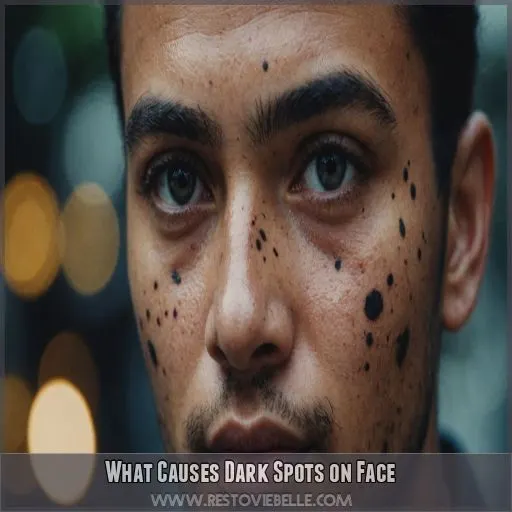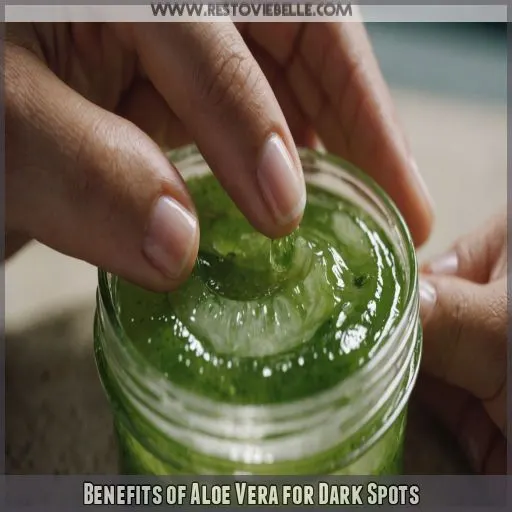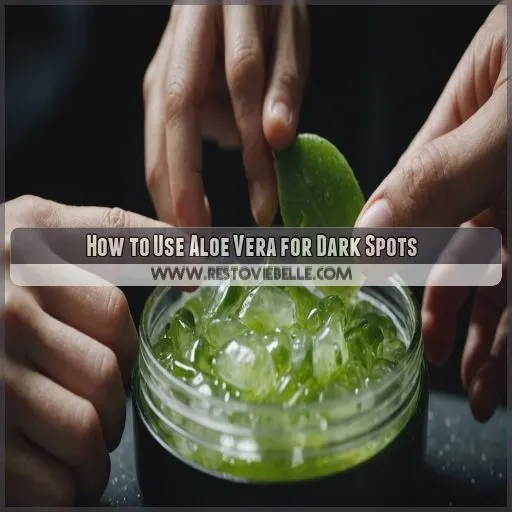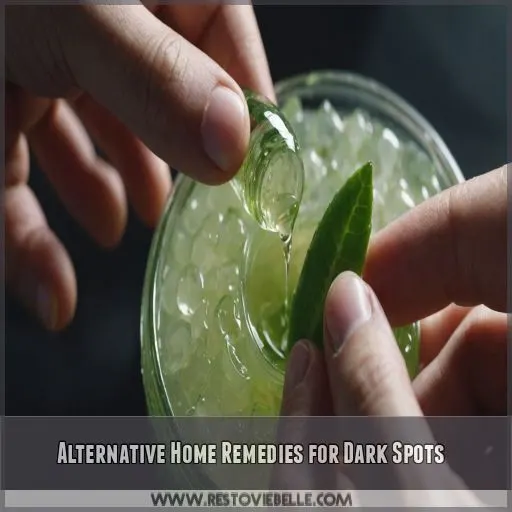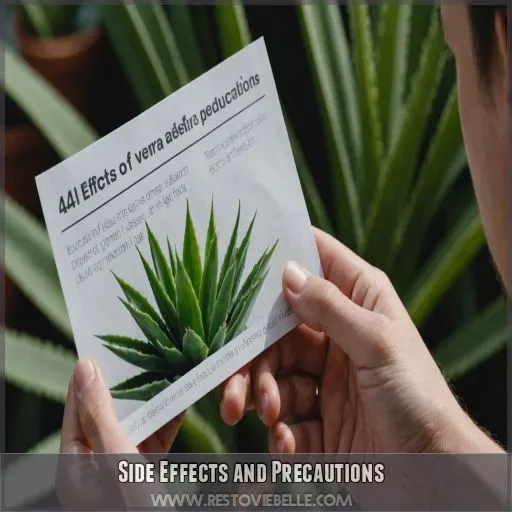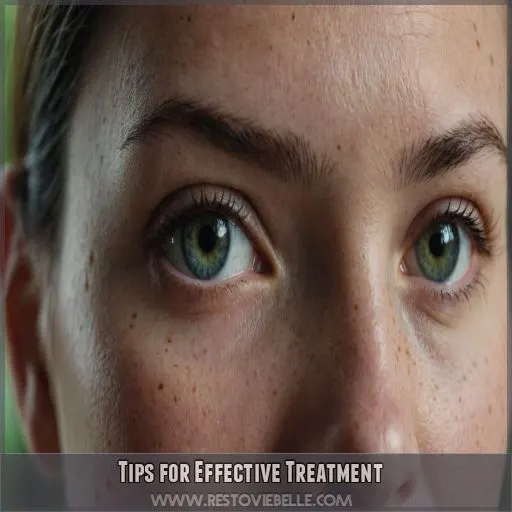This site is supported by our readers. We may earn a commission, at no cost to you, if you purchase through links.
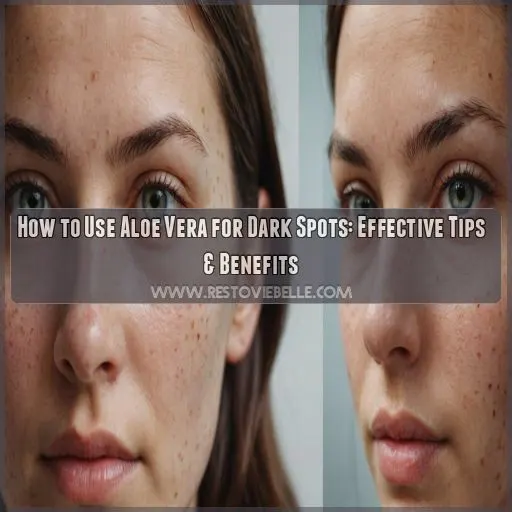
Its skin-lightening properties can help reduce pigmentation.
To use aloe vera, slice open a healthy leaf and scoop out the gel.
Gently massage this gel onto your dark spots like you’re painting a delicate masterpiece.
Do this daily, perhaps before your bedtime ritual, and rinse it off in the morning.
With a dash of patience and consistency, you might notice a change.
And here’s a little kicker—there are more tips to supercharge aloe’s effects.
Shall we explore them together?
Table Of Contents
- Key Takeaways
- What Causes Dark Spots on Face
- Benefits of Aloe Vera for Dark Spots
- How to Use Aloe Vera for Dark Spots
- Alternative Home Remedies for Dark Spots
- Side Effects and Precautions
- Tips for Effective Treatment
- Incorporating Aloe Vera Into Your Skincare Routine
- Frequently Asked Questions (FAQs)
- How to use aloe vera gel on dark spots?
- What are the home remedies to remove dark spots on the face?
- How to use aloe vera for lightening skin spots?
- Can aloe vera remove black spots?
- How long does it take for aloe vera to work on dark spots?
- Will aloe vera remove dark spots?
- How do you use aloe vera to clear spots?
- What happens if I apply aloe vera gel every night?
- How long does aloe vera take to work on dark spots?
- Can aloe vera help fade dark spots and acne scars?
- Should aloe vera be left on overnight for dark spots?
- Does aloe vera need to be diluted for treating dark spots?
- How often should aloe vera gel be applied for dark spots?
- Conclusion
Key Takeaways
- Aloe vera’s skin-lightening properties can help fade those pesky dark spots on your face, and it’s a natural alternative to some of the ingredients found in dark spot serums.
. Just slice open a leaf, scoop out the gel, and gently massage it onto the affected areas daily.
- Don’t forget to pair aloe vera with other natural remedies like vitamin C or kojic acid for an even bigger skin-brightening boost. It’s like a dynamic duo for your complexion!
- Be patient and consistent with your aloe vera routine. While it may not work overnight, with time and TLC, you’ll start to see those dark spots gradually fade away.
- Remember to protect your skin from the sun – it’s the ultimate wingman in your quest for an even, glowing complexion. Slather on that broad-spectrum sunscreen and let aloe vera work its magic.
What Causes Dark Spots on Face
Dark spots on your face can be pesky, but understanding their causes may help you manage them better. They’re often caused by excess melanin from sun exposure or pesky pimples, making your skin look like it’s playing connect-the-dots.
Hyperpigmentation and Its Effects
Plagued by pesky dark spots on your face? Don’t fret – hyperpigmentation, the culprit behind these unwelcome visitors, is a common skin condition that affects people of all ages and backgrounds. While it may seem like a nuisance, understanding the root cause can empower you to tackle this skin concern head-on.
Common Causes of Dark Spots
Sun damage loves to crash skin’s party, causing those pesky dark spots. Hormonal changes play their part, too, especially during pregnancy. Acne scars can leave unwanted souvenirs, stubbornly sticking around. Medications? Some, like a mischievous magician, can alter your skin tone. So, remember:
- Use sunscreen daily
- Keep stress at bay
- Consult a dermatologist
- Explore home remedies like aloe vera
Role of Melanin in Skin Pigmentation
Ever wondered why your skin’s pigmentation varies? It’s all about melanin—your skin’s personal artist. There are two types: eumelanin and pheomelanin, creating your unique palette. Sun exposure can crank up production, leading to dark spots.
| Factor | Effect on Skin |
|---|---|
| Melanin Types | Skin tone variation |
| Sun Exposure | Increased melanin |
| Melanin Disorders | Uneven pigmentation |
Skin pigmentation loves consistency, much like a finicky roommate—control it for a glowing face.
How to Identify Dark Spots
Identifying dark spots on your face is the first step to treating them effectively understanding dark spots.
, and using vitamin E oil can be a helpful part of your routine.
.
Look for patches of skin that appear darker than the surrounding area.
These could be flat, raised, or even scaly.
The size, color, and location of the spots can provide clues about the underlying cause.
With aloe vera’s skin-lightening properties, you’re on your way to a clearer, more even complexion.
Benefits of Aloe Vera for Dark Spots
Aloe vera is your skin’s new best friend for tackling dark spots, thanks to its key chemicals aloin and aloesin, which are known for their skin-lightening properties. While some studies have shown its effectiveness in reducing pigmentation, combining aloe vera with other remedies like niacinamide or vitamin C can amp up your skincare game for even better results.
Skin-Lightening Properties of Aloe Vera
Aloe vera’s skin-lightening magic might feel like finding a unicorn in your skincare stash. It can help with melasma, freckles, or even a pregnancy mask! You might use aloe vera versus hydroquinone, but be cautious of aloe vera safety concerns. Experts suggest:
- Try combining with vitamin C.
- Consider pairing with kojic acid.
- Be patient with results.
- Stay sun-smart!
Aloin and Aloesin: Key Chemicals in Aloe Vera
Aloin and aloesin, the dynamic duo in aloe vera, pack a powerful punch against dark spots. Aloin can actually destroy existing melanin cells, while aloesin prevents further melanin production – a one-two knockout combo for fading those pesky pigments. With these skin-lightening superstars on your side, you’re well on your way to a brighter, more even complexion.
Studies on Aloe Vera’s Effectiveness in Reducing Pigmentation
Research into aloe vera’s melanin reduction magic is promising.
Clinical trials suggest aloesin in aloe vera might lighten pigmentation by reining in melanin.
While there’s no magical dosage for every skin type, studies hint at regular application being a wise move.
Combining Aloe Vera With Other Remedies for Better Results
Aloe vera’s great alone, but pairing it with other natural remedies like apple cider vinegar or vitamin C can work wonders on those stubborn dark spots. Think of it as a dynamic duo for your skin. Mix aloe vera into a DIY mask with a splash of lemon juice or red onion. Trust me, your skin will thank you!
How to Use Aloe Vera for Dark Spots
Using aloe vera for dark spots can be an easy and natural remedy, much like calling an old friend for advice natural remedies for dark spots.
. You’ll need to extract the gel, apply it correctly, and store any leftovers properly, but don’t worry—your face won’t turn into a science experiment.
Extracting Aloe Vera Gel From the Plant
After learning about aloe vera’s benefits, it’s time to extract the gel.
Choose a healthy aloe vera plant, snip mature leaves, and use a spoon to scrape the gel after removing prickly edges.
Store it in the fridge to keep it fresh.
This gel can be your secret weapon against dark spots, offering a natural touch to skin aging remedies.
Applying Aloe Vera Gel to Dark Spots
To apply aloe vera gel for dark spots, gently massage a thin layer onto the affected areas.
The cooling, soothing gel absorbs quickly, making it easy to incorporate into your daily skincare routine.
Consistency is key, so try to apply it a few times a day for best results.
The natural compounds in aloe vera may gradually fade discoloration over time.
Recommended Dosage and Frequency of Application
You’re thinking about using aloe vera for those pesky dark spots on your face, aren’t you? Here are a few things to keep in mind:
- Start with a thin layer once a day; if your skin is happy, increase to twice.
- Listen to your skin—needs and frequency vary.
- Results aren’t instant; patience is key!
Storing Aloe Vera Gel for Later Use
To keep your aloe vera gel as fresh as a daisy, store it in the fridge. Cold storage extends its shelf life and keeps that gel consistency just right. Use airtight containers to prevent contamination—nobody wants mystery goo on their face! With proper storage, aloe vera remains a trusty sidekick in your dark spots skincare routine.
Alternative Home Remedies for Dark Spots
In addition to aloe vera, there are several other natural ingredients that may help diminish the appearance of dark spots. From apple cider vinegar to azelaic acid, these alternative home remedies offer a range of skin-lightening benefits to explore.
Apple Cider Vinegar and Its Skin-Lightening Properties
Switching gears from aloe vera to another natural ally, apple cider vinegar could help lighten those pesky dark spots with ease. With its acetic acid, it can:
- Balance skin pH
- Lighten acne scars
- Exfoliate like a pro
- Work naturally
- Require vinegar dilution for safety
Azelaic Acid and Its Effects on Hyperpigmentation
While apple cider vinegar might add some zing to your routine, let’s chat about azelaic acid. It’s a multitasker in skincare, known for evening out skin tone and treating pesky acne. Azelaic acid reduces hyperpigmentation with efficacy studies backing its power. However, watch out for side effects. Pairing with aloe vera could supercharge dark spot reduction — a natural tag-team!
Side Effects and Precautions
While aloe vera gel is generally safe for most people, there’s a small risk of allergic reactions or skin irritation. If you experience any side effects like rashes or discomfort, be sure to discontinue use and consult your dermatologist.
Allergic Reactions to Aloe Vera
Before you dive headfirst into the world of aloe vera, it’s wise to keep an eye out for signs of an allergy. Identifying aloe vera allergy symptoms can save you from a lot of scratching and face-pulling! Here’s what to look out for:
- Itching sensation
- Redness or swelling
- Small bumps
- Burning feeling
Skin Irritation and Rashes
| Issue | Symptom |
|---|---|
| Aloe vera allergies | Redness or rash |
| Rash prevention | Avoid known irritants |
| Treatment options | Cool compress |
| Irritant contact dermatitis | Itchy skin |
| Skin sensitivity | Patch test first |
Try a patch test before diving in. And remember, aloe vera’s benefits often outweigh its quirks!
Interactions With Other Medications
Aloe vera is generally safe, but it can interact with some medications.
It’s important to be aware of potential interactions between aloe vera and topical treatments or prescription alternatives.
Always check with your doctor before using aloe vera to ensure it won’t interfere with any medications you are taking.
When to Discontinue Use
If you experience side effects like skin irritation or an allergic reaction, it’s time to hit the brakes! Redness or a burning sensation could mean aloe vera’s not your friend. Don’t tough it out; your skin deserves TLC, not TLC with a side of discomfort. When in doubt, let your dermatologist be your skincare GPS.
Tips for Effective Treatment
To get the most out of aloe vera for your dark spots, it’s important to consult a dermatologist for proper diagnosis and treatment. Additionally, addressing any underlying scarring early on can really improve your results.
Consulting a Dermatologist for Proper Diagnosis
Consider a dermatologist visit as your skin’s secret weapon. They’ve got the know-how to decode the mystery of your spots, determining if they’re due to hyperpigmentation or other skin conditions. Accurate diagnosis leads to precise treatment options. Think of them as your skin whisperer, helping figure out the right path to a spot-free glow. Don’t guess, consult!
Treating Scars Early for Better Results
Here’s the scoop: Treating scars early can make a world of difference. Grab this chance by incorporating specific scar-reducing techniques into your routine. Gently massage the area using trusted creams or opt for natural remedies to gradually fade those scars. Remember, minimizing their appearance takes patience and persistence. Don’t wait—embrace the journey to radiant skin today!
Moisturizing Regularly to Reduce Scarring
Keeping your skin well-moisturized is key to reducing the appearance of scars. Look for hydrating ingredients like hyaluronic acid and ceramides that strengthen your skin’s barrier. Incorporate a moisturizer into your daily routine, applying it after cleansing to lock in moisture. Your skin will thank you with a smoother, more even-toned complexion.
Protecting Your Skin From the Sun
You’ve slathered on moisturizer, but sun protection‘s your secret weapon against dark spots. Embrace sun safety with broad-spectrum sunscreen. Think of it as an umbrella on a sunny day. Explore sunscreen types, and don’t skimp! Apply it generously. Remember, the sun’s love is relentless, so develop sun protection habits and prevent sun damage. Dark spots will thank you!
Incorporating Aloe Vera Into Your Skincare Routine
Adding aloe vera to your skincare routine is like inviting nature’s gentle healer into your home—a soothing ally against dark spots. We’ll guide you on using aloe vera alongside other products, ensuring your skin gets the serene spa treatment it deserves without having to break the bank.
Creating a Skincare Routine With Aloe Vera
Incorporating aloe vera into your daily skincare routine is a simple yet effective way to tackle dark spots.
Start by gently cleansing your face, then apply a thin layer of aloe vera gel.
Let it soak in before following up with your regular moisturizer.
For an extra boost, try making a soothing aloe vera face mask a few times a week.
Using Aloe Vera in Combination With Other Products
You’ve crafted your skincare routine, now let’s mix aloe vera with other goodies! Imagine pairing aloe vera with vitamin C for a bright boost or teaming it with retinol for a smooth charm. You could even blend it with kojic acid, licorice root, or green tea for an all-star team. With aloe, your skin’s on a winning streak!
Making Aloe Vera Face Masks and Creams at Home
To make your own aloe vera face masks and creams at home, simply blend the fresh gel with ingredients like honey, oatmeal, or vitamin E. Store any leftover mixtures in the fridge for up to a week. Aloe vera is gentle enough for sensitive skin, so feel free to get creative with your homemade skincare recipes.
Tips for Long-Term Use and Maintenance
Incorporating aloe vera into your routine is like nurturing a plant – it takes patience, consistency, and a little TLC. Keep those dark spots at bay with these tips:
- Consistency is key: Apply aloe daily.
- Sun protection is a must: Use SPF.
- Prevention over cure: Moisturize regularly.
- Patience pays off: Results may take time.
Stay diligent!
Frequently Asked Questions (FAQs)
How to use aloe vera gel on dark spots?
To treat dark spots, apply a thin layer of aloe vera gel directly onto the spots twice daily. Aloe’s aloin and aloesin compounds inhibit melanin, gradually lightening the areas. Think of it as nature’s gentle eraser.
What are the home remedies to remove dark spots on the face?
Try aloe vera gel, apple cider vinegar, or turmeric paste on those stubborn dark spots. Mix in a little green tea or milk for added oomph. Remember, consult a dermatologist if things don’t clear up.
How to use aloe vera for lightening skin spots?
For lightening skin spots, gently apply aloe vera gel directly onto the affected areas. Use fresh gel or purchase a product, and aim to do this a few times daily. Consistent use might just be your secret weapon!
Can aloe vera remove black spots?
Wondering if aloe vera‘s your skin knight? While it can’t whisk away black spots overnight, its aloin and aloesin may help reduce them. Slather it on and see the magic unfold, like a slow-blooming flower.
How long does it take for aloe vera to work on dark spots?
Aloe vera isn’t a magic wand; it may take several weeks or even months to see improvement on dark spots. Apply that gel consistently and be patient—your skin writes its own story over time!
Will aloe vera remove dark spots?
Aloe vera might help lighten dark spots thanks to compounds like aloin and aloesin, which can reduce melanin. It’s like nature’s little eraser, but results vary, so don’t expect a miracle overnight.
How do you use aloe vera to clear spots?
Think of aloe vera as your skin’s trusty sidekick. Harvest its magic gel from the plant, and apply it to the dark spots twice daily. It’s a natural remedy that’s gentle, but patience is your strongest ally.
What happens if I apply aloe vera gel every night?
Applying aloe vera gel every night can hydrate your skin and potentially reduce dark spots over time. Picture it as your skin’s nightly lullaby, soothing and rejuvenating without harsh side effects. Just check for any irritation!
How long does aloe vera take to work on dark spots?
Wondering if aloe vera’s the magic bullet for dark spots? Typically, it can take several weeks to notice changes. It’s not overnight magic, but with regular application, you’ll see gradual improvements. Patience and consistency are key!
Can aloe vera help fade dark spots and acne scars?
Aloe vera may help fade dark spots by inhibiting melanin, but it’s not a magic bullet for acne scars. Consistent application can lighten spots over time, like slowly erasing a chalk mark on life’s canvas (Source).
Should aloe vera be left on overnight for dark spots?
Aloe vera, the skin’s secret weapon! Leaving it on overnight is like a magical slumber party for your complexion. Just don’t overdo it – moderation is key to avoid any unwanted side effects. Embrace the power of this natural wonder, but with a gentle touch.
Does aloe vera need to be diluted for treating dark spots?
You don’t need to dilute aloe vera for treating dark spots. Just scoop that gel out, slap it on your skin, and let it do its magic. If your skin throws a fit, ease up on it.
How often should aloe vera gel be applied for dark spots?
Think aloe vera gel is a magic wand? Well, its effects aren’t instant, but applying it to dark spots several times a day is safe and might help. Use it regularly, and you might just see progress!
Conclusion
Imagine your skin as a canvas, and you’ve got a toolbox brimming with paint.
The right tools make all the difference.
Aloe vera, with its skin-lightening properties, is a trusty companion in your quest.
Knowing how to use aloe vera for dark spots on your face empowers you with effective, natural options.
Approach this journey with a dash of humor and consistency, and watch your skincare masterpiece unfold.
Just remember, every artist started with a first stroke!

